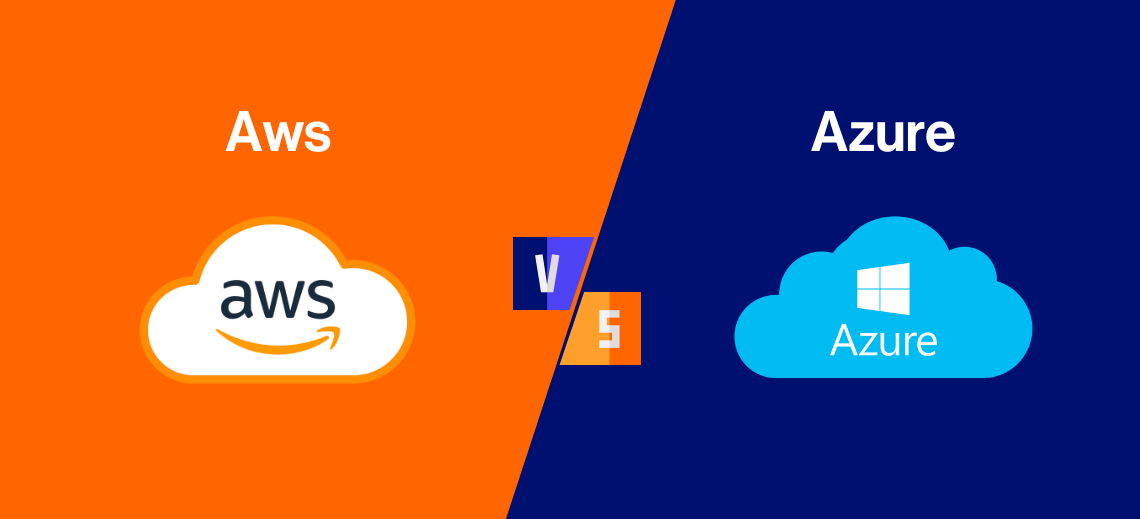AWS vs. Azure: Which is Best for DevOps?
 Syed Ameen Hussaini
Syed Ameen Hussaini
When it comes to DevOps, two of the most popular cloud platforms are Amazon Web Services (AWS) and Microsoft Azure. Both provide a robust set of tools and services, but which one is best for your DevOps needs? Let’s break it down! 🌟
🚀 Overview
Amazon Web Services (AWS) and Microsoft Azure are leading cloud service providers offering a wide range of services, including those tailored for DevOps. Here’s a comparison of their DevOps capabilities, features, and strengths.
⚙️ Core DevOps Services
AWS DevOps Services
AWS CodePipeline: Automates the build, test, and deploy phases of your release process.
AWS CodeBuild: Fully managed build service that compiles source code, runs tests, and produces software packages.
AWS CodeDeploy: Automates software deployments to a variety of compute services.
AWS CodeStar: Provides a unified interface for managing software development activities.
Amazon Elastic Container Service (ECS): Highly scalable container orchestration service.
Azure DevOps Services
Azure Pipelines: CI/CD service supporting any platform or language.
Azure Repos: Provides Git repositories or Team Foundation Version Control (TFVC) for source control.
Azure Artifacts: Package management for Maven, npm, NuGet, and Python packages.
Azure Boards: Agile tools to support planning and tracking work.
Azure Kubernetes Service (AKS): Simplified deployment and management of Kubernetes clusters.
🌟 Key Features
AWS
Mature Ecosystem: AWS has a wide range of mature services and integrations, making it a strong choice for complex environments.
Global Reach: AWS has the largest number of data centers around the globe, ensuring low latency.
Comprehensive Security: Offers robust security features and compliance certifications.
Flexible Pricing: Pay-as-you-go pricing with various cost-saving options like Reserved Instances.
Azure
Integrated Environment: Azure DevOps provides an integrated suite of tools, enhancing collaboration and productivity.
Strong CI/CD: Azure Pipelines supports multi-cloud deployments and is highly customizable.
Enterprise Support: Excellent support for enterprises, especially those already using Microsoft products.
Hybrid Capabilities: Strong focus on hybrid cloud solutions, integrating on-premises and cloud environments seamlessly.
💡 Use Cases
AWS
Startups and SMEs: Ideal for small to medium enterprises looking for scalable solutions.
Enterprises with Diverse Needs: Suitable for large organizations with diverse and complex needs.
Global Applications: Great for applications that need a global reach due to its extensive data center network.
Azure
Microsoft-Centric Organizations: Best for companies heavily invested in the Microsoft ecosystem.
Enterprise Applications: Excellent for large enterprises needing robust CI/CD pipelines.
Hybrid Environments: Perfect for businesses looking to integrate on-premises infrastructure with the cloud.
🤔 Pros and Cons
AWS Pros
Extensive service offerings
Wide global reach
Strong security and compliance
AWS Cons
Can be complex to manage
Costs can add up quickly
Azure Pros
Seamless integration with Microsoft products
Strong support for hybrid cloud
User-friendly interface
Azure Cons
Fewer global data centers compared to AWS
Learning curve for non-Microsoft users
💬 Conclusion
Choosing between AWS and Azure for DevOps largely depends on your specific needs and existing infrastructure. If you're already in the Microsoft ecosystem, Azure might be the best choice. For those needing a broad range of services and a global presence, AWS is the way to go. Both platforms offer powerful DevOps tools, so you can't go wrong with either! 🚀
Happy DevOps-ing! Which platform do you prefer? Let us know in the comments below! 💬
Subscribe to my newsletter
Read articles from Syed Ameen Hussaini directly inside your inbox. Subscribe to the newsletter, and don't miss out.
Written by

Syed Ameen Hussaini
Syed Ameen Hussaini
Devops engineer & Computer Engineering (+917020648402) As a DevOps Engineer & Azure certified Devops solution Expert , I specialize in designing, implementing, and maintaining cloud-based infrastructure using Amazon Web Services (AWS). My expertise includes using Python to automate infrastructure management and configuration, as well as working with Linux operating systems to ensure the reliability and scalability of infrastructure. I have extensive knowledge using Git and GitHub for version control, and I am well-versed in configuration management tools like Chef, Docker, and Ansible. Additionally, I have a strong background in building and managing CI/CD pipelines using Jenkins , GitHub action , ECS and Kubernetes, and other tools, and I have worked extensively with monitoring tools like Nagios , Prometheus , Grafana to ensure the health and performance of production systems. My knowledge also includes working with infrastructure-as-code tools like Terraform and Helm, as well as build automation tools like Maven. I have worked extensively with Microsoft SharePoint, PowerApps, and PowerAutomate, and I am comfortable working in cross-functional teams to deliver high-quality software and infrastructure solutions. If you're looking for a DevOps Engineer with expertise in AWS, Python, Linux, Git & GitHub, Chef, Docker, Ansible, CI/CD pipelines, Jenkins, GitHub action ,Kubernetes, Nagios, Terraform, Helm, Maven, Microsoft SharePoint, PowerApps, and PowerAutomate, please feel free to reach out to me. I'd be happy to discuss how I can help your organization build and maintain reliable, scalable, and cost-effective infrastructure. And also Basic soft skills in Android📱 iOS development with flutter.🧑🏻💻 Thank you 😊